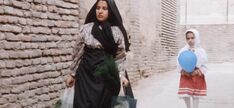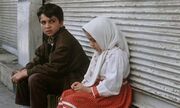When he saw that the little boy selling the balloons finally discovered the money that the protagonist Nacia had lost, he showed a secretly calculating look, thinking that he would wait for the brothers and sisters to get the money and find a way to grab it. Also wondered why Nasia's brother took the wooden pole from the boy so rudely until they called him "that Afghan boy".
Until the Afghan boy came back, there were a few balloons missing from the wooden pole, but more touching "Timely Rain" chewing gum in his hand. In a rare close-up of the front, he was facing the audience with a happy and equal smile. Children are no longer looked down upon and insignificant. They really became the protagonists, and the problem of withdrawing money began to become a game. This is the way for children, so the difficulty is not a big deal, and the game is easy.
But the Afghan boy wasn't allowed to join, he just watched, eager to try. The true meaning of the title "White Balloon" began to appear.
When the brothers and sisters successfully got the money, they ran away with lightning speed and ran home with the goldfish bowl in their hands. The boy who sold the balloons was sitting crookedly on the spot with a wooden pole tied with a white balloon. We followed the camera and kept staring at him, and heard three times that the person riding a bicycle was singing. Everyone was busy and was in a hurry to go home. Happy New Year. The apprentice in the tailor shop next door passed by and chatted with a few passers-by. The old man who passed by said to the boy sitting there, "Go home, child." The most well-intentioned are always individual elderly and children, but where? He was still sitting at the door of the closed shop, listening to the countdown to the New Year on the nearby radio, feeling lost. Except for the fleeting smile, his expression is very inconspicuous. If his expression can't stir up any splashes, will he be expressionless? The final shot is frozen on him after getting up. Is he going home? Or sell the last white balloon?
The audience's eyes have been focused on the Afghan boy who broke in near the end, as if the camera was also caught by this passer-by who was not in the plan, no longer chasing our protagonist Nasia, and even her final farewell. don't care. Narcia is supposed to stop for a moment after running past the camera for the last time, we can't see her, just hear her brother ask her "what are you waiting for?" and then they disappear completely. The camera couldn't bear to follow the protagonist away, and still looked at him intently. This kind of caring perspective and attitude is like staring at the old cans that roll down all the way in "Close-Up".
I have never seen balloons sold with wooden poles. Why sell balloons tied to wooden poles? Is it because it's too easy to fly away in your hand? Even Narcia tugged low on her beloved balloon. The balloon is no longer close to the sky here, and the toy seems so heavy.
What kind of thrilling afternoon did Narcia and her brother spend on New Year's Eve? The sudden difficult dominoes seem to be one after another, but fortunately, the danger is finally saved. So what about the difficulties of this Afghan boy? For him, Nacia's troubles are probably something he can't even think about. His mother's nagging, his father's anger, and Nacia's fascinated swimming is like a dancing expensive goldfish. Nacia's brother would rather use the Two movies for goldfish money...what a luxury. Does he have parents or brothers? Has he secretly praised the goldfish for stopping by? Has he seen even one movie? Can't help but wonder, besides him, what about those Afghan girls? What about the women? How will they be?
The owner of the goldfish told Nasia that the goldfish are all thin when viewed from the top of the tank, and are all fat when viewed from the side. Does the deceptiveness of perspective affect us too? Was the overzealous soldier, the snake dancer who took the money from the Nasia fish tank, really that suspicious? We don't know, like we don't know what reason my brother used to persuade Mom to buy goldfish. The world is never open to the child, nor is it to the audience.
It was Afghans and soldiers again, thinking of the Afghan students in Abbas' later work "The Taste of Cherry" and the smiling soldiers holding flowers in the most obscure and real DV.
Kids help kids doesn't always hold. The boy who sold the balloons was forgotten by the siblings in an instant, and these children were just as helpless when faced with adults. And what about the mother? Mingming was also helplessly trapped in endless labor, and even when faced with children, she always assumed a strong posture.
It is comforting that Narcia stops for the little boy selling the balloons for a while before leaving at the end of the credits, maybe at that moment she waved and said goodbye softly like the soldiers before. It was the only thing she could do at a young age.
Because of the strict subject matter restrictions, Iranian filmmakers have aimed at children within a limited choice, but this has not stopped them from facing the truth and discovering the ills in reality. Therefore, Iranian children's films not only have a consistent innocence, but also have life dilemmas that children can't get rid of. I gradually understood why there are so many films that are very interested in the tension between the real and the false, and they are all from Iran, and I deeply admire the tenacity that is not restricted by the rules.
There is also a question in my heart, not only for film creators, but for everyone in society, is the incompetence of people (there is nothing to do), is it because there are too many restraints that people can do too little? Or do people underestimate themselves too much? As said in "The Rhythm of Ten Lives", we are unfortunate because we are too dependent. What is preventing you from being yourself?
View more about The White Balloon reviews








